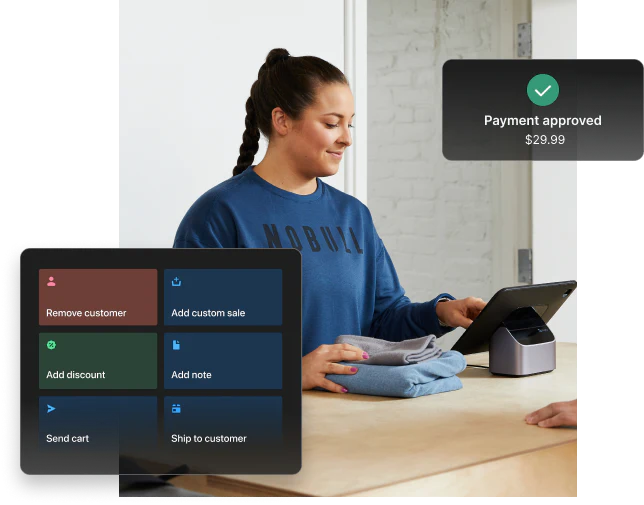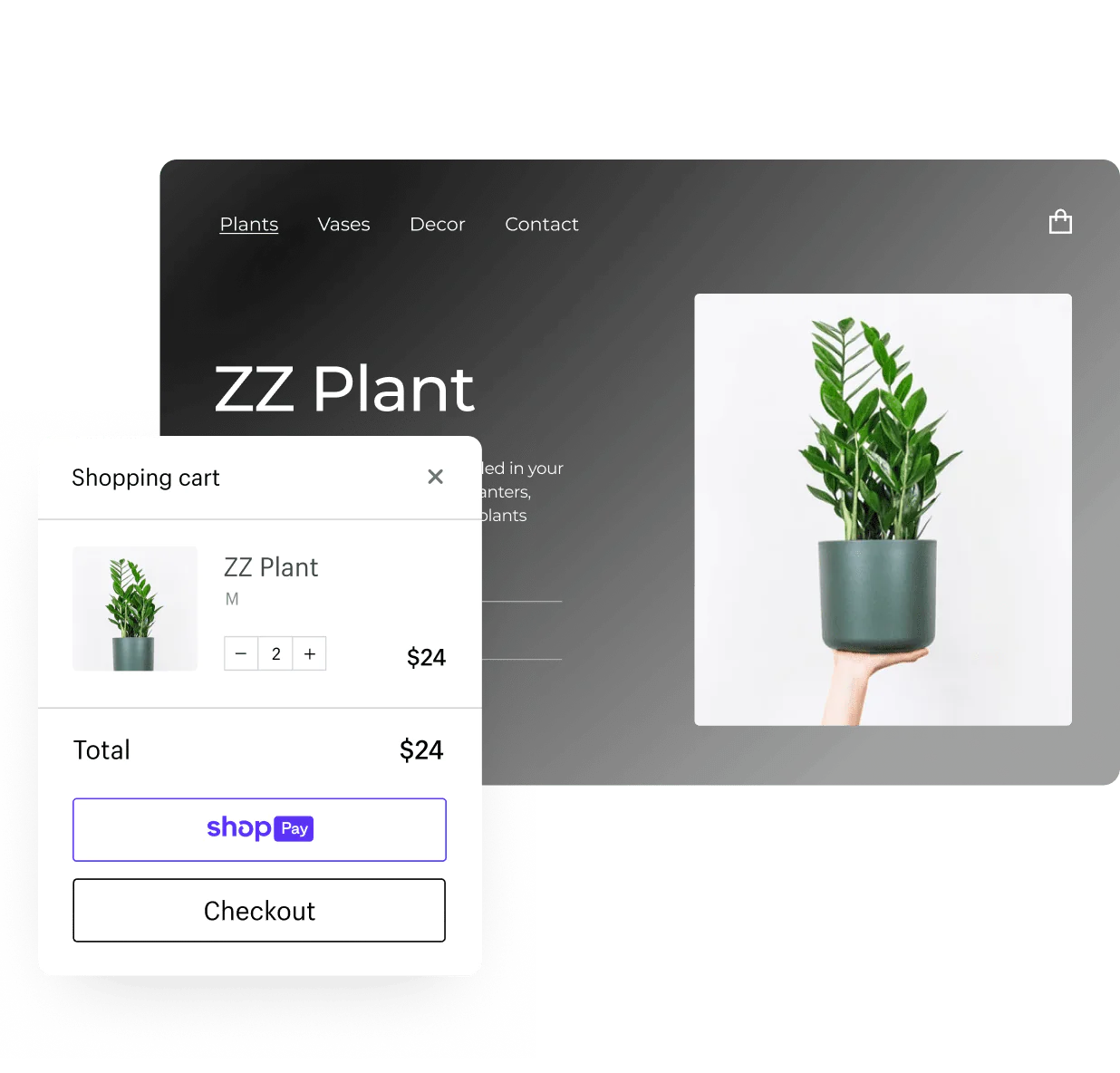About Shopify

Shopify is an e-commerce platform that allows individuals and businesses to create an online store to sell their products and services. The company was founded in 2006 and has since grown to become one of the leading e-commerce platforms in the world, with over 1.7 million merchants using the platform to power their online stores.
Shopify provides a range of tools and services to help merchants build and manage their online stores, including website design and development, payment processing, order fulfillment, and shipping. The platform is also customizable, allowing merchants to tailor their online stores to their specific needs and preferences.
In addition to its core e-commerce platform, Shopify offers a range of other products and services, including point-of-sale systems, marketing and advertising tools, and integrations with third-party apps and services. Shopify is also known for its strong community and support network, with a range of resources and forums available to help merchants succeed on the platform.
Overall, Shopify is a powerful e-commerce platform that offers a range of tools and services to help individuals and businesses succeed in the online marketplace.
Shopify Pros and Cons
Here are some pros and cons of using Shopify as an e-commerce platform:
Pros:
- User-friendly: Shopify is known for its user-friendly interface, making it easy for anyone to set up and manage an online store.
- Design customization: Shopify offers a range of customizable templates and themes, allowing merchants to create a unique and professional-looking online store.
- Payment processing: Shopify provides built-in payment processing, making it easy for merchants to accept payments from customers.
- App integrations: Shopify has a large app store with a wide range of third-party apps and integrations, allowing merchants to add additional features and functionality to their online stores.
- Customer support: Shopify offers 24/7 customer support through various channels, including live chat, email, and phone.
Cons:
- Transaction fees: Shopify charges transaction fees for using third-party payment gateways, which can add up over time and impact profit margins.
- Limited free themes: Although Shopify offers customizable templates and themes, many of the high-quality themes come at a cost.
- Pricing: Shopify’s pricing can be more expensive compared to other e-commerce platforms, particularly for smaller businesses.
- Limited customization: Although Shopify offers a range of customization options, it may not have the same level of flexibility and customization as other e-commerce platforms.
- SEO limitations: Some users have reported limitations in SEO capabilities on the Shopify platform, which can impact the visibility and ranking of online stores in search engine results pages.
Overall, Shopify offers a range of powerful tools and services to help individuals and businesses succeed in the online marketplace. However, it is important to consider the platform’s pros and cons before deciding whether it is the right e-commerce platform for your specific needs and goals.
Shopify At a Glance
Here is a brief overview of Shopify:
- Shopify is an e-commerce platform that allows individuals and businesses to create an online store to sell their products and services.
- It was founded in 2006 and has since grown to become one of the leading e-commerce platforms in the world, with over 1.7 million merchants using the platform.
- Shopify provides a range of tools and services to help merchants build and manage their online stores, including website design and development, payment processing, order fulfillment, and shipping.
- The platform is customizable, allowing merchants to tailor their online stores to their specific needs and preferences.
- Shopify offers a range of other products and services, including point-of-sale systems, marketing and advertising tools, and integrations with third-party apps and services.
- It has a large app store with a wide range of third-party apps and integrations, allowing merchants to add additional features and functionality to their online stores.
- Shopify offers 24/7 customer support through various channels, including live chat, email, and phone.
The platform charges a monthly subscription fee, with additional fees for using third-party payment gateways.
Shopify is known for its user-friendly interface and strong community and support network.
Other Benefits

Here are some other benefits of using Shopify:
- Mobile responsiveness: Shopify is optimized for mobile devices, ensuring that online stores look and function well on smartphones and tablets.
- SEO-friendly: Shopify has built-in SEO features, making it easy for merchants to optimize their online stores for search engines and improve their visibility in search engine results pages.
- Secure hosting: Shopify provides secure hosting for online stores, ensuring that customer data and transactions are protected with industry-standard security measures.
- Order management: Shopify provides a range of tools for managing orders, including order tracking, inventory management, and shipping and fulfillment options.
- Multichannel selling: Shopify integrates with a range of sales channels, including social media platforms and marketplaces, allowing merchants to sell their products and services across multiple channels.
- Analytics and reporting: Shopify provides built-in analytics and reporting features, allowing merchants to track and analyze key metrics related to their online stores, including sales, traffic, and customer behavior.
Overall, Shopify provides a range of powerful tools and features to help individuals and businesses succeed in the online marketplace. Its user-friendly interface, strong community and support network, and range of customizable options make it a popular choice for merchants of all sizes and industries.
How Shopify Stacks Up
In terms of how Shopify stacks up against other e-commerce platforms, here are some key points to consider:
- Ease of use: Shopify is known for its user-friendly interface and easy-to-use tools, making it a popular choice for beginners and those with limited technical expertise.
- Design customization: Shopify offers a range of customizable templates and themes, allowing merchants to create a unique and professional-looking online store.
- Payment processing: Shopify provides built-in payment processing, making it easy for merchants to accept payments from customers.
- App integrations: Shopify has a large app store with a wide range of third-party apps and integrations, allowing merchants to add additional features and functionality to their online stores.
- Customer support: Shopify offers 24/7 customer support through various channels, including live chat, email, and phone.
- Pricing: Shopify’s pricing can be more expensive compared to other e-commerce platforms, particularly for smaller businesses.
- SEO capabilities: While Shopify offers built-in SEO features, some users have reported limitations in its capabilities compared to other platforms.
Overall, Shopify is a powerful e-commerce platform with a range of customizable options, user-friendly tools, and strong customer support. However, it may not be the best fit for every business, particularly those with more complex needs or smaller budgets. It is important to compare and evaluate different e-commerce platforms to determine which one is the best fit for your specific needs and goals.
Is Shopify Right for You or Your Business?
Determining whether Shopify is right for you or your business ultimately depends on your specific needs, goals, and budget. Here are some factors to consider:
- Type of business: Shopify is a versatile platform that can accommodate a range of business types and sizes, from small startups to large enterprises. However, if you have very specific needs or require highly customized features, it may not be the best fit.
- Budget: Shopify charges a monthly subscription fee, with additional fees for using third-party payment gateways and other features. While the platform offers a range of pricing plans, it may be more expensive compared to other e-commerce platforms, particularly for smaller businesses.
- Technical expertise: Shopify is known for its user-friendly interface and easy-to-use tools, but some technical expertise may be required to fully customize and optimize your online store.
- Integrations and features: Shopify offers a wide range of integrations and features, but it’s important to evaluate whether they meet your specific needs and requirements.
- Marketing and sales channels: Shopify integrates with a range of sales channels, including social media platforms and marketplaces, which can be beneficial for businesses looking to expand their reach.
Overall, Shopify is a powerful e-commerce platform with a range of features and tools that can help businesses of all sizes succeed in the online marketplace. However, it’s important to evaluate your specific needs and goals to determine whether Shopify is the right fit for your business. You may want to consider other e-commerce platforms as well to compare and evaluate your options.
Frequently Asked Questions (FAQs)
Here are some frequently asked questions about Shopify:
What is Shopify?
Shopify is an e-commerce platform that allows individuals and businesses to create online stores and sell products and services.
How does Shopify work?
Shopify provides a range of tools and features to help individuals and businesses create and manage online stores. This includes customizable templates and themes, payment processing, order management, and a range of integrations and features.
How much does Shopify cost?
Shopify offers a range of pricing plans, starting at $29 per month for the Basic Shopify plan and going up to $299 per month for the Advanced Shopify plan. Additional fees may apply for using third-party payment gateways and other features.
What types of businesses can use Shopify?
Shopify is a versatile platform that can accommodate a range of business types and sizes, from small startups to large enterprises.
What payment options are available with Shopify?
Shopify provides built-in payment processing through Shopify Payments, as well as support for a range of third-party payment gateways.
Does Shopify offer website hosting?
Yes, Shopify provides website hosting for online stores.
Can Shopify be used for selling both physical and digital products?
Yes, Shopify can be used to sell both physical and digital products.
Does Shopify offer customer support?
Yes, Shopify offers 24/7 customer support through various channels, including live chat, email, and phone.
What integrations and apps are available with Shopify?
Shopify has a large app store with a wide range of third-party apps and integrations, allowing merchants to add additional features and functionality to their online stores.
Is Shopify SEO-friendly?
Yes, Shopify has built-in SEO features to help optimize online stores for search engines and improve their visibility in search engine results pages.



0 Comments